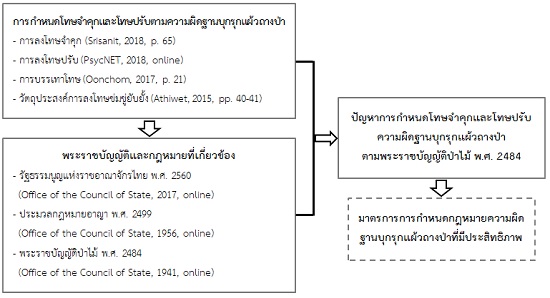ปัญหาเกี่ยวกับการกำหนดโทษจำคุกและโทษปรับความผิดฐานบุกรุกแผ้วถางป่า ตามพระราชบัญญัติป่าไม้ พ.ศ. 2484
DOI:
https://doi.org/10.14456/nrru-rdi.2022.65คำสำคัญ:
การกำหนดโทษ, จำคุก, ปรับ, ความผิดฐานบุกรุกแผ้วถางป่า, เหตุบรรเทาโทษบทคัดย่อ
การวิเคราะห์พระราชบัญญัติในทางกฎหมายเป็นกระบวนการสำคัญหนึ่งที่ช่วยปรับปรุงมาตรการทางกฎหมายให้มีประสิทธิภาพมากขึ้น ดังนั้นงานวิจัยนี้จึงมีวัตถุประสงค์เพื่อ 1) ศึกษาปัญหาการกำหนดโทษจำคุกและโทษปรับฐานบุกรุกแผ้วถางป่า 2) ศึกษาปัญหาการนำเหตุบรรเทาโทษประมวลกฎหมายมาบังคับใช้ และ 3) หามาตรการเกี่ยวกับการกำหนดโทษจำคุกและโทษปรับฐานบุกรุกแผ้วถางป่ามาเป็นแนวทางในการแก้ไขปรับปรุงพระราชบัญญัติป่าไม้ พ.ศ. 2484 ที่มีประสิทธิภาพ เป็นการศึกษาเชิงเอกสารร่วมกับการสัมภาษณ์ โดยทำการคัดเลือกกลุ่มผู้ให้ข้อมูลสำคัญแบบเจาะจง จำนวน 12 คน ใช้แบบสัมภาษณ์แบบมีโครงสร้างที่ได้รับการรับรองจริยธรรมการวิจัยในมนุษย์เก็บรวบรวมข้อมูลด้วยการสัมภาษณ์เชิงลึกอย่างไม่เป็นทางการ และวิเคราะห์ข้อมูลด้วยการวิเคราะห์ส่วนประกอบ จำแนกและจัดระบบข้อมูล ผลการวิจัยพบว่า 1) การที่กฎหมายกำหนดบทลงโทษผู้กระทำผิดฐานบุกรุกแผ้วถางป่า โดยกำหนดโทษจำคุกไม่เกินห้าปี หรือปรับไม่เกินห้าหมื่นบาท กลุ่มตัวอย่างส่วนมากเห็นว่า ควรแก้ไขจำคุกและโทษปรับให้สูงขึ้น กลุ่มตัวอย่างส่วนน้อยบางส่วนเห็นว่าโทษจำคุกและโทษปรับเหมาะสมแล้วและอีกบางส่วนเห็นว่าควรแก้ไขโทษให้น้อยลง 2) การนำเหตุบรรเทาโทษตามประมวลกฎหมายอาญามาบังคับใช้กับพระราชบัญญัติป่าไม้ พ.ศ. 2484 มีความเหมาะสมแล้วไม่ต้องแก้ไข และ 3) มาตรการที่ได้คือ การแก้ไขโทษจำคุกและปรับให้สูงขึ้นหรือปรับตามที่ได้รับความเสียหาย ดังนั้น เพื่อให้กฎหมายสามารถปราบปรามผู้กระทำความผิดฐานบุกรุกแผ้วถางป่าได้ หากได้มีการแก้ไขโทษให้สูงขึ้นทำให้ความผิดฐานบุกรุกแผ้วถางป่ามีจำนวนลดน้อยลง
เอกสารอ้างอิง
A1. (2021, 16 July). Researcher in Facalty of Law. Interview. (In Thai)
A2. (2021, 15 July). Population. Interview. (In Thai)
A3. (2021, 15 July). Population. Interview. (In Thai)
A4. (2021, 15 July). Population Interview. (In Thai)
A5. (2021, 15 July). Village hadman. Interview. (In Thai)
A6. (2021, 7 July). Professional forestry scholar. Interview. (In Thai)
A7. (2021, 8 July). Justice. Interview. (In Thai)
A8. (2021, 14 July). Director of Legal Affairs Division. Interview. (In Thai)
A9. (2021, 7 July). Deputy Superintendent (Investigation). Interview. (In Thai)
A10. (2021, 7 July). Deputy Inspector (Investigation). Interview. (In Thai)
A11. (2021, 7 July). Deputy Inspector (Investigation). Interview. (In Thai)
A12. (2021, 7 July). Deputy Inspector (Investigation). Interview. (In Thai)
Athiwer, A. (2015). Theory of Criminology and the Criminal Justice System (2nd ed.). Bangkok : V.J. Printing. (In Thai)
Dhutinan, A. (2014). Criminology and Penology (2nd ed.). Bangkok : Winyuchon. (In Thai)
Forest Resources Management Office 7, Ubon Ratchathani Branch. (2017). Account of forest intrusion case 2017-2021. (Mineographed) (In Thai)
Forestresources. (2021). Forest knowledge. Retrieved December 22, 2021, from http://forestclass55. blogspot.com/2017/02/blog-post.html (In Thai)
Limprasert, S., Saengchansri, S., & Manathon, A. (2019). Criminal Offenders’ Punishment. In National Research Conference, Rangsit University, 26 April 2019 (pp. 1484-1493). Bangkok : Rangsit Univertsity. (In Thai)
Office of the Council of State. (1941). Forest Act. B.E. 1941. Retrieved March 13, 2021, from http://web.krisdika.go.th/data/law/law2/%BB26/%BB26-20-9999-update.pdf (In Thai)
Office of the Council of State. (1956). Criminal Code, 1956. Retrieved March 22, 2021, from http://www.hydro.navy.mi.th/download/Criminal_Code.pdf (In Thai)
Office of the Council of State. (1964). National Reserved Forests Act 1964. Retrieved March 13, 2021, from https://www.hrdi.or.th/public/files/About/02-Regulations/04-Others/07-OtherRules2507.pdf (In Thai)
Office of the Council of State. (1992). Wildliife Preservation and Protection Act, B.E. 2535. Retrieved March 13, 2021, from http://web.krisdika.go.th/lawHeadPDF.jsp?formatFile=pdf&hID=0 (In Thai)
Office of the Council of State. (2017). Constitution of the Kingdom of Thailand B.E. 2560. Retrieved March 13, 2021, from https://www.krisdika.go.th/librarian/get?sysid=774606&ext=pdf (In Thai)
Oonchom, L. (2017). The Suitable Sentencing to the Offender of Norcotic Drugs. Thesis, Master of Laws Program in Department of Law, Pridi Banomyong Faculty of Law, Dhurakij Pundit University, Bangkok. (In Thai)
Pinitkanwattanakul, T. (2004). Court is mitigation reasoning under Article 78 of the Criminal Code. This personal academic paper is part of the course training “judge of the court of first instance”. Institute for Judicial Development of the Court of Justice. (In Thai)
PsycNET. (2018). Why do we punish? Deterrence and Just Deserts as motives for punishment. Retrieved March 22, 2021, from http:/psycnet.apa.org/buy/2002-17391-00
Sankosik, U. (1980). Criminal Law Part 1. Bangkok : Ruenkaewprinting. (In Thai)
Srisanit, P. (2018). High Criminal Law (2nd ed.). Bangkok : Winyuchon. (In Thai)
Summary report Summary-Department of National Parks. (2021). Summary of Forest lllegal Reports of agencies under the Department of National Parks, Wildlife and Plant Conservation, fiscal year 2009-2002. Retrieved February 18, 2022, from http://115.31.166.198/DNP/ FileSystem/download?uuid=1ac1c467-8773-4742-9175-c052088fb385.pdf (In Thai)
Suttiyotin, N. (2011). Theory of Punishment. Educational Documents, Criminal Law and Advaced Criminology Course Set, Unit 6. Nonthaburi : Sukhothai Thammathirat Open University. (In Thai)
The Chaipattana foundation. (2021). Theory of Forest Restoration Development under the Royalinitia tive. Retrieved March 19, 2021, from https://www.chaipat.or.th/concept-and-theory-development/theory-developed-forest-restoration.html (In Thai)
Woraphat, T. (2014). Criminal Enforcement Measures. Bangkok : Winyuchon. (In Thai)

ดาวน์โหลด
เผยแพร่แล้ว
รูปแบบการอ้างอิง
ฉบับ
ประเภทบทความ
สัญญาอนุญาต

อนุญาตภายใต้เงื่อนไข Creative Commons Attribution-NonCommercial-NoDerivatives 4.0 International License.




